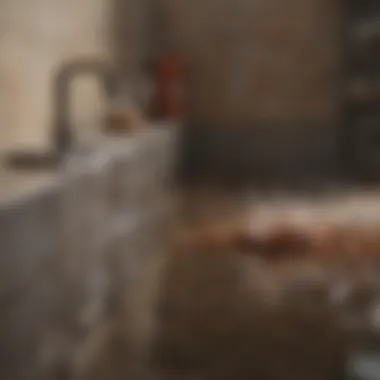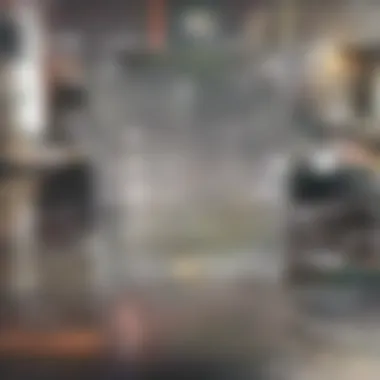Effective Home Remedies for Grease Clogged Drains


Intro
Clogged drains are a common issue many homeowners face. Among these, grease buildup often serves as a major culprit. The accumulation of cooking oils and fats can create blockages that hinder the flow of water, leading to frustrating situations. A clogged drain not only disrupts daily routines but also poses potential plumbing crises if left unattended.
This guide will delve into effective home remedies designed to clear grease-clogged drains. We will discuss practical methods that utilize ingredients commonly found in homes, alongside preventative strategies. Understanding the causes and solutions will empower homeowners to take control of their plumbing issues.
Rather than relying solely on commercial products with harsh chemicals, these home remedies can provide safe and eco-friendly alternatives for maintaining clear drains.
Understanding Grease Clogs in Drains
Understanding grease clogs in drains is essential for any homeowner. Grease accumulation can severely affect plumbing systems. The topic becomes more crucial in today's world of increasing awareness about home maintenance. Addressing grease clogs efficiently can prevent costly repairs and inconveniences. This section lays the foundation for recognizing how grease impacts our drainage systems, highlighting its causes, effects, and signs of clogs.
Causes of Grease Build-Up
Grease clogs typically originate from kitchen waste. When food is cooked, oils and fats are the primary offenders. These substances often go down the drain during clean-up. Over time, they can stick to pipe walls, accumulating more debris. Other contributors include:
- Soap residue: Soap can combine with grease, forming a sticky build-up.
- Food particles: Small food remnants can add to the grease accumulation.
- Improper disposal: Pouring fats directly into the sink is a common mistake.
Understanding these causes can help in preventing future clogs.
How Grease Affects Drain Functionality
The functionality of a drain is compromised when grease builds up. Water struggles to flow freely, causing slow drainage or complete blockages. This stagnation can lead to:
- Increased pressure: Over time, pressure builds within the pipes. This can lead to leaks or pipe bursts.
- Odors: Accumulated grease can create foul smells that permeate the home.
- Pest attraction: Standing water from clogged drains can attract pests.
Addressing grease issues promptly can maintain the overall health of your plumbing system.
Signs of Clogged Drains
Being able to identify early signs of clogged drains is vital. Homeowners should be attentive to the following:
- Slow drainage: Water takes longer to go down the sink.
- Unpleasant odors: Foul smells are often indicative of stagnation.
- Gurgling sounds: Unusual noises from drains may signal trapped air.
Recognizing these signs early can prevent more severe plumbing challenges.
"Ignoring grease build-up can create a compounding problem, making a small issue into a significant one."
The Risks of Ignoring Grease Clogs
Ignoring grease clogs in drains can lead to significant issues. Many homeowners don't realize the implications until it is too late. There are important facets that warrant attention when neglecting this problem. It goes beyond simple inconvenience to serious damage and health concerns. Understanding these risks can prompt timely action, ensuring a well-functioning plumbing system.
Potential Damage to Plumbing
Grease accumulation can create a substantial blockage within pipes. With time, this build-up hardens, causing pressure to rise in plumbing lines. If left unattended, it may result in pipes bursting or leaking. Such events can compromise structural integrity, leading to costly repairs. The situation is worsened if grease interacts with other materials in the pipe, leading to stubborn clogs.


Additionally, the pipe material can corrode over time. This corrosion often worsens when exposed to certain substances found in commercial cleaners. Homeowners may apply these industrial solutions to resolve blockages, unaware that they might be causing long-term damage instead. Therefore, a proactive approach is critical in managing grease clogs to safeguard plumbing health.
Health Risks Associated with Unmanaged Clogs
Allowing grease-related clogs to persist can pose a variety of health risks. As water backs up and stagnates, it creates a breeding ground for bacteria. This can result in foul odors and potential contamination of household water supplies.
In addition, stagnant water can attract pests. Insects, rodents, and other unwanted creatures may find a suitable habitat in and around greasy clogs. This introduces further health hazards, as these pests can carry diseases.
Contaminated drainage systems can lead to more significant health issues for the occupants of a home. Proper attention to clogs not only maintains a clean environment but also supports overall household health.
"Timely intervention is critical; ignoring grease clogs is an invitation to plumbing disasters and health hazards."
Addressing these issues promptly can prevent damage and health hazards. Homeowners should take necessary steps to manage grease clogs, maintaining their plumbing systems effectively.
Traditional Methods for Unclogging Greasy Drains
Traditional methods for unclogging greasy drains remain vital for homeowners facing plumbing challenges. These approaches often involve mechanical or chemical techniques that can effectively remove stubborn grease buildup. Understanding these methods is crucial because, despite the availability of modern solutions, many times conventional methods can resolve issues with less effort and lower costs. Such methods provide immediate relief when faced with clogged drains and can often be done without substantial professional intervention.
Mechanical Approaches
Mechanical approaches offer a hands-on way to address grease clogs. These techniques rely on physical intervention rather than chemical reactions, which can sometimes be more suitable for sensitive plumbing systems.
Using a Plunger
Using a plunger is a widely recognized method for clearing clogs. Its simplicity is a distinct aspect. A plunger works by creating a vacuum effect, effectively dislodging grease and debris that may be blocking the drain. This tool is particularly beneficial for localized clogs that are not too deep within the plumbing system.
One unique feature of the plunger is its versatility; it can be used in sinks, bathtubs, and toilets. The main advantage is that it requires no chemicals, making it an eco-friendly option. However, this method does demand physical effort and may not succeed with severe clogs. While it is a popular choice, one must ensure that the plunger's cup is well-fitted to the drain for effective results.
Snake or Auger Techniques
Snake or auger techniques involve the use of a specialized tool that can reach deeper into the plumbing system than a plunger. The key characteristic of this method is its ability to break through clogs that are further down the pipe. The snake can maneuver through bends and traps in the plumbing, tackling blockages that other methods might fail to address.
A significant advantage of using a snake is its effectiveness against tough clogs, including those caused by accumulated grease, hair, and other organic materials. Nevertheless, operating a snake requires skill; improper use can lead to damage in the pipes. This method is thus better suited for those who are comfortable with basic plumbing tasks.
Chemical Solutions
Chemical solutions provide an alternative means of tackling grease clogs that may not respond to mechanical methods. These solutions often contain ingredients that dissolve grease, allowing it to flow freely through the pipes once again.
Commercial Drain Cleaners
Commercial drain cleaners are a common chemical solution for managing clogs. Their main characteristic is their high potency and quick action. Many formulations claim to dissolve the materials comprising a clog effectively. This capability makes them a beneficial option for immediate results.
However, a notable disadvantage of these products is their potential harm to both the plumbing and the environment. Overuse can lead to pipe corrosion and other long-term damage, raising concerns for sustainable home maintenance. Each user must weigh the effectiveness against these potential risks.
Environmental Concerns


Environmental concerns regarding chemical drain cleaners are growing. Weighing the effectiveness of these cleaners against their impact on the environment is critical. The chemicals used can pollute water supplies and disrupt ecosystems. Therefore, it is important for homeowners to consider eco-friendly alternatives when possible.
The unique aspect of this concern is the increased availability of natural or less harmful cleaning agents that can provide similar efficacy without as much risk. A significant advantage here is the safety they offer, both for users and the environment. By considering these cleaner options, one can both maintain the plumbing system and contribute positively to environmental preservation.
Home Remedies Utilizing Common Ingredients
Baking Soda and Vinegar
How to Prepare the Mixture
To create a baking soda and vinegar mixture, start with a half cup of baking soda. Pour it directly into the clogged drain. Follow this with a half cup of vinegar. Once these ingredients are combined, they will react, creating bubbles. It is important to leave this mixture for at least 30 minutes, allowing it to work on the grease.
This method is popular due to its non-toxic nature and ease of use. The bubbling action helps to dislodge grease, making it a beneficial choice in home remedy solutions. While this method is generally safe, be cautious not to use it after any store-bought chemical cleaners, as reactions can happen.
Expected Outcomes
The expected outcome of using baking soda and vinegar is a clearer drain. The reaction will help break down the grease clog, resulting in improved water flow. Many users notice a reduction in odors as a result of this process. However, the effectiveness can vary depending on the severity of the clog. This method is often favored due to its simplicity; yet, it may not work for all types of clogs, thus presenting a limitation.
Dish Soap and Hot Water
Method of Application
Using dish soap is straightforward. Begin by squirt a generous amount of dish soap into the drain. Then, follow it with a pot of boiling water. This combination can help to loosen greasy clogs, making it simpler for water to flow through. Since dish soap is designed to cut through grease, it is a beneficial approach in dealing with kitchen drains.
The unique feature of this method is its immediate action; however, be mindful of the temperature of the water. Too much boiling water can sometimes damage certain types of plumbing.
Effectiveness and Limitations
This method is effective because it addresses grease directly. The dish soap targets the greasy residue while the hot water flushes it down. However, it may not fully clear tougher clogs, particularly those caused by solidified grease. Users should not rely solely on this method for severe clogs, as it may need to be complemented with others.
Salt and Boiling Water
Procedure to Follow
To use salt and boiling water, simply pour a half cup of salt down the drain. After allowing it to sit for about 15 minutes, follow it with a pot of boiling water. This method is strong enough to dissolve and help push through some grease blocks. The main advantage of this technique is the combination of abrasive action from the salt and the melting capability from hot water. This can make it a favorable choice for routine maintenance of drains.
Benefits of This Method
The benefits of using salt and boiling water include its ability to dissolve fat and grease. It can also be a preventative measure when used regularly. However, this method is limited in capacity. While it is unlikely to harm your plumbing, it may require additional support for serious blockages.
Cornstarch as a Preventative Measure
How to Use It Effectively
To use cornstarch, pour about a half cup down the drain on a monthly basis. This acts as a preventative measure by absorbing moisture and limiting grease build-up. This method is rather simple, and it utilizes a common kitchen item.
It is a beneficial practice because it can assist in maintaining clear pipes over time. However, cornstarch should not be seen as a direct remedy but more of a preventative action.
Long-Term Impacts
Using cornstarch can help prevent clogs in the long run. It reduces the buildup of grease, which is vital for prolonged plumbing health. However, relying only on this method without addressing existing blockages can be ineffective. Regular application may need to be combined with other methods for best results.


Preventative Strategies for Maintaining Clear Drains
Maintaining clear drains is essential to prevent grease clogs before they become a serious issue. Grease buildup in drainage systems is not only unsightly but can lead to significant plumbing problems. You can significantly reduce the likelihood of encountering heavy clogs by using effective preventative strategies. The emphasis here is on reducing grease accumulation in your pipes, ensuring your plumbing system operates smoothly.
Regular Cleaning Practices
Consistent cleaning of your drains is a simple yet powerful strategy to keep them functioning well. Ensuring the drains remain clear can prevent larger problems down the line. Regular maintenance should focus on periodic cleaning, using natural methods whenever possible.
- Use boiling water: Pouring boiling water down the drain can dissolve minor grease residues. This practice should be done monthly to ensure grease does not build up.
- Baking soda and vinegar flush: These two ingredients, when combined, create a chemical reaction that can help clear minor blockages and maintain cleanliness. Using this method can be done twice a month.
- Routine inspections: Taking a few moments each month to inspect and clean visible drain openings can greatly help in early detection of potential blockages. Keeping the area clear of debris can prevent accumulation.
Proper Disposal of Greasy Waste
Proper disposal of greasy substances is crucial in preventing clogs. Grease should never be poured down the drain. Instead, consider these practices:
- Use containers: Collect cooking oil and grease in a container and dispose of it in the trash. This small step can greatly reduce grease going into the plumbing system.
- Wipe dishes before washing: Use paper towels to wipe grease off dishes and pans before rinsing them. This quick action ensures that much less grease enters the drain during regular dishwashing.
- Educate household members: Make sure everyone understands proper disposal methods. This awareness can prevent accidental clogs created by careless disposal of greasy waste.
Installing Drain Screens
Drain screens act as a physical barrier, preventing larger food particles and grease from entering your pipes. This relatively inexpensive solution can have substantial benefits:
- Effectiveness: Installing screens over sink and shower drains can catch food scraps, hair, and other debris.
- Easy maintenance: Screens can be easily removed and cleaned, which helps keep your drains clear with minimal effort.
- Diverse options: Various types of drain screens are available, so you can find one that fits your drains well. Consider options that have fine mesh to catch smaller particles.
Implementing these preventative strategies in your home can lead to a healthier plumbing system and less frequent issues with grease clogs. Regular cleaning, proper waste disposal, and the use of drain screens are effective ways to avoid future problems.
When to Seek Professional Help
It is essential to recognize the signs of a more severe plumbing problem when dealing with grease clogged drains. Home remedies can be effective for minor clogs, but sometimes they are insufficient. Understanding when to seek professional help is critical. Ignoring plumbing issues can lead to extensive damage and more costly repairs down the line. Consulting a professional plumber can save you time, money, and stress.
Indicators of Severe Clogs
Several indicators suggest that you may be dealing with severe clogs:
- Persistent Drain Issues: If you notice that your drain continues to clog despite repeated home remedy attempts, it is time to call in the experts.
- Multiple Drains Affected: When multiple fixtures show signs of blockage, like sinks, showers, or toilets, this is often an indication of a larger issue within the plumbing system.
- Foul Odors: A recurring unpleasant smell emanating from the drains can signify stagnant water or decomposing materials blocking pipes.
- Water Backup: If water is backing up into other fixtures, such as sinks or bathtubs when you use them, this should prompt immediate action from a professional.
- Slow Draining: While some slow drainage can be handled at home, combining this with other indicators may signal that a professional needs to assess the situation.
These signs can indicate serious blockages beyond the reach of simple remedies.
Choosing a Plumbing Professional
Choosing the right plumbing professional is crucial for effective resolution of the problem. Consider the following elements when making your selection:
- License and Insurance: Ensure the plumber holds a valid license and is adequately insured. This protects you and your property in case of mishaps during repairs.
- Experience and Specialization: Look for professionals with a proven track record in handling grease-related plumbing issues. Specialized experience can make a significant difference in the quality of the service.
- Customer Reviews: Explore customer feedback through platforms like Reddit or Facebook to gauge the reliability and satisfaction of past clients. Positive reviews can offer reassurance of quality workmanship.
- Estimates and Transparency: A trustworthy plumber should provide a clear estimate before commencing work. Transparency about costs and procedures is a key factor.
"Professional help is not just about fixing the problem; it is about ensuring it does not recur, protecting your investment in your home plumbing system."
Closure
Homeowners must recognize that grease clogs can lead to severe plumbing issues over time. The remedies discussed, such as baking soda and vinegar or dish soap and hot water, are straightforward yet powerful tools against grease buildup. They offer a low-cost, eco-friendly approach to drain care, which aligns well with sustainability efforts in modern households.
Moreover, embracing preventative strategies—like regular cleaning and proper waste disposal—provides a proactive stance against potential clogs. This knowledge empowers homeowners to take control of their plumbing environments. It leads to less reliance on professional services, saving both time and money.
Ultimately, the importance of understanding grease clogs cannot be overstated. This article serves as a vital resource for those committed to ensuring efficient and clear plumbing systems. As homeowners implement these strategies, they contribute to healthier home environments while ultimately enhancing property value.







